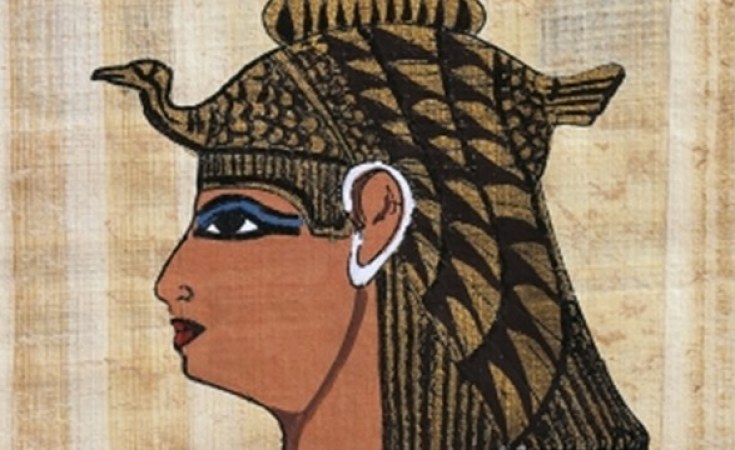The trailer for Netflix's new four-part documentary series, Queen Cleopatra, was deliberately provocative. Promoting the show as executive produced by actress Jada Pinkett-Smith, it prominently featured historian Professor Shelley Haley declaring that: "Cleopatra was black."
Perhaps unsurprisingly, the trailer is pure clickbait. The show itself is a much more complex piece of work.
There are two ways to watch Queen Cleopatra. The first - and easiest - is by paying more attention to the dramatisation of Cleopatra's life and times than to the academic talking heads. The second is to do the opposite.
If you choose the former, you will find plenty of ammunition for criticism without even touching upon the decision to present Cleopatra, the royal family and the wider Graeco-Egyptian population as black. Although no doubt this is where much supposedly critical analysis will both begin and end.
While the scenery, sets and costumes are sumptuous and evocative (if not entirely historically accurate) the script is terrible and the acting is unable to elevate it.
Adele James does her best with Cleopatra, managing to convincingly portray her as both a naive 20-year-old and a world weary 40-year-old, all the while looking incredibly glamorous.
She is hampered, however, by a Caesar (John Partridge) who either whispers sinisterly or froths at the mouth, a weak and weaselly Antony (Craig Russell) and a psychotic-seeming, over-acting Octavian (James Marlowe).
If you choose to focus on the academics, instead of the drama, you will probably be pleasantly surprised.
The documentary features a bastion of experts drawn from the disciplines of classics, comparative literature, ancient history, archaeology, Egyptology and Nubian studies. They refer to literary, documentary and archaeological evidence to support the points they make throughout. Their commentary is specific, detailed and nuanced.
A monarch of many faces
The controversy-inciting quotes included in the trailer have been taken completely out of context. In reality, the commentators are keen to differentiate between what we know about Cleopatra and what we do not.
They also stress the extent to which she has become mythologised - a figure of fantasy rather than reality, someone upon whom people can project their own ideas and even desires.
We do not know the identity of Cleopatra's maternal grandmother. Her father, Ptolemy XII, was illegitimate and so his mother may well have been an Egyptian courtesan.
Nor do we know the identity of her mother. It has been suggested, based on Cleopatra's ability with the Egyptian language and her devotion to the Egyptian pantheon, that she may have been a member of the family that held the hereditary priesthood of Ptah. This influential ruling family held high-level positions in ancient Egyptian cities like Memphis.
We have no securely identified portraits of her other than those found on her coins, all of which vary considerably. So any claims as to the specifics of her appearance can be safely dismissed.
As can sweeping statements regarding her identity. Cleopatra was simultaneously Macedonian, Egyptian and Roman. In the habit of emphasising different aspects of her identity to suit different audiences, she would not have considered herself either white or black, because modern concepts of race would have been unknown to her.
Additionally, whether she was beautiful or not is not something that concerned her peers. In fact, Greek philosopher Plutarch was keen to say that it was her charisma that made her so appealing. It was not until 300 years after Cleopatra's death that historians began discussing her beauty at all.
What was more important was that she was rich and in possession of the natural and mineral resources that first Caesar, then Antony and finally Octavian needed to achieve their own political and military aims.
Airbrushing Cleopatra's reputation
I found the modern soundtrack and dialogue (frequent uses of "hi", "yeah" and, most egregiously, "OK") far more anachronistic and intrusive than the casting.
The first episode is by far the strongest, both in the breadth and depth of historical material covered and the overall production values. But as the series continues, its limitations become more apparent. The sets and supporting cast start to disappear, the pacing becomes subject to padding and the narrative takes a turn to the speculative.
The documentary also does a fair bit of airbrushing to the queen's reputation. It seeks to present Cleopatra and her actions in the best possible light while villainising others to manufacture conflict. Her younger sister Arsinoe suffers particularly here.
I can certainly appreciate the desire to focus on Cleopatra rather than the men in her life, but presenting Caesar, Antony and Octavian as so "one note" does not help elucidate the character of Cleopatra, but rather obscures it.
The series does, however, close with the acknowledgement that her daughter Cleopatra Selene would become an African queen in turn, ruling the Roman client kingdom of Mauretania alongside her husband Juba. As the son of the deposed King of Numidia, in north-west Africa he was definitely a person of colour, as were their children and successors.
It is this conclusion that highlights the fundamental flaw in the documentary's approach. Cleopatra's story is all too familiar.
For 2,000 years we have seen version after version of her story, some more historically accurate, others less - but we are far less familiar with other African queens. Not just Cleopatra Selene, but also Cleopatra's contemporary and neighbour, Amanirenas of Kush.
Audiences know - or at least think they know - everything about Cleopatra and are unlikely to be persuaded otherwise, no matter how proficient a documentary might be. But as far as her fellow African queens are concerned, we have barely scratched the surface.
Queen Cleopatra is available to stream on Netflix globally from May 10.
Jane Draycott, Lecturer, Classics, University of Glasgow


